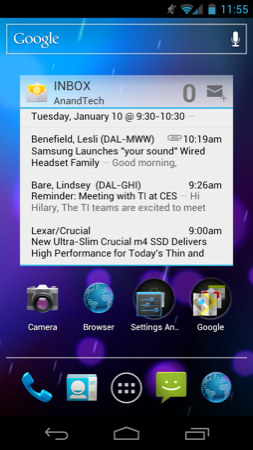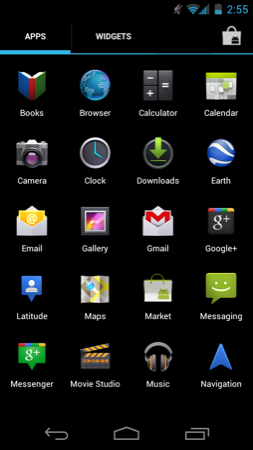Samsung Galaxy Nexus & Ice Cream Sandwich Review
by Brian Klug & Anand Lal Shimpi on January 18, 2012 1:34 PM ESTGoogle employs more than 20,000 people worldwide and the number of them working on Android are in the single digit percentage range. Google's business is search, but it has always had aspirations of more. Android isn't just a chance to capitalize on mobile search for Google, it's also an opportunity to grab power in the next era of personal computing. If you believe that smartphones will eventually replace mainstream PCs, who wouldn't want to be to smartphones what Microsoft was to PCs in the early 1990s?
Previous versions of Android have been cautious, evolutionary steps along a path to being a more open/flexible alternative to iOS. Starting with Honeycomb (Android 3.0) however, Google began to step out of the shadow of its competitors and really start to define Android as a mobile computing platform. Honeycomb was limited to tablets but its successor, Ice Cream Sandwich (Android 4.0), would bring unification to Android across both tablets and smartphones.
Today we look at both ICS and its launch vehicle, Google's Galaxy Nexus.
The Android vs. iOS Debate
It's very clear to me now more than ever that Apple and Google have completely different goals with their mobile OS strategies. Excluding the unclear strategy behind Chrome OS, Android is pretty much Google's primary operating system. The unified tablet/smartphone strategy behind Ice Cream Sandwich makes sense because for Google to succeed in the OS business it needs to deploy Android on everything from smartphones to notebooks. We've already seen the strengths in having a smartphone platform with a strong app ecosystem. Things become even more appealing if you have a phone, tablet and PC that all run the same OS and apps. As Android is Google's one-size-fits-all operating system, it needs to have a broader and slightly more ambitious focus than iOS otherwise it risks losing the race in the long run.
Apple is in a different position. It already has a successful desktop/notebook OS that is continuing to grow. While iOS has been a runaway success for Apple, the Mac OS X platform is a solid option for any user who needs more than their iPhone or iPad can provide. The two OSes may converge or at least borrow heavily from one another, but in the interim they can remain independent. If you need more of a computing experience Apple is happy to sell you a Mac. If you want the it-just-works appliance experience in your phone or tablet, Apple has a whole bunch of iPhone/iPad configurations to offer you.


ICS isn't a step towards iOS. If anything it proves that Google is committed to its own trajectory. Android is an OS that, although more closed than many would like, still allows more flexibility than iOS. You can sideload apps not purchased in the Market. The file system isn't completely hidden from you. You can even override the default zoom level on web pages. Apple and Google both pour tons of time and research into figuring out the best way to do something. And, to be honest, I feel like Apple generally does a better job of "getting it" for the very mainstream consumer. Rather than attempt to make the perfect mold however, Google gives you one that's a bit more flexible.
I've said this before but I do believe that Apple is trying to deliver more of an appliance experience, whereas Google is providing you with a modern take on a traditional computing experience. If the appliance is a smartphone, then both approaches are equally capable - it's just a matter of personal preference.
What's new in ICS really falls into one of three categories:
- Improvements in UI frame rate due to OpenGL ES rendering (non-skia) path
- UI tweaks
- New features
Nowhere in this list is a fundamental change in the way Android works. I feel that this is a very important point to understand and likely the cause for lots of disagreement when it comes to just how impressive (or not) ICS is.
ICS is smoother, more polished and has its own set of new features that make it a significant step forward for Android. What ICS is not however is an outright clone of iOS. If you prefer the iOS experience to Android, ICS will do nothing to change your opinion. If all you were missing from Android was a smoother UI, then its fourth major release should be almost everything you could ask for.










185 Comments
View All Comments
StormyParis - Wednesday, January 18, 2012 - link
Android should use the tried and true method of siplaying a *screenshot* of the home page as soon as the home button is pressed, and then replacing it with the live version. Btton presses are indeed way too laggy.CoryS - Wednesday, January 18, 2012 - link
I feel it is worth mentioning that custom kernels, combined with 4.03 have completely removed the task switcher lag. The latest version of Francos Kernel has increased idle battery life by an incredible margin (I lose about 1% every 10 hours on idle) and it has removed all UI lag I noticed on the stock device.dwang - Wednesday, January 18, 2012 - link
+1My gn is buttery smooth with 4.0.3 bigxie ROM and franco kernel.
Best phone I've ever used and I've owned every nexus phone (nexus one, nexus s) and the g1.
bjacobson - Wednesday, January 18, 2012 - link
this is why people go to Apple, because Google, even on their flagship phone, can't make it out better than the modding community.dwang - Wednesday, January 18, 2012 - link
what exactly are you babbling about. 4.0.3 is responsible for most of the performance improvements and thats from google.phantomash - Thursday, January 19, 2012 - link
If Apple did such a good job on iOS then why is there the term "jailbreak"?doobydoo - Thursday, January 19, 2012 - link
For the minority of users who want to use a different OS to iOS?A number, which you should take note, is far lower than the percentage of Android users who want to 'root' their phone (the equivalent).
Tetracycloide - Thursday, January 19, 2012 - link
Of course it's far lower, the people that want to customize like that avoid Apple because it's not as customization. It's an intellectually dishonest self-fulfilling statement that demonstrates absolutely nothing.Blackened144 - Thursday, January 19, 2012 - link
That goes both ways.. If Google did such a good job on Android, why is there the term "root"?Tetracycloide - Thursday, January 19, 2012 - link
Your response to a post highlighting the strengths of a partially open platform vis a vis third party kernel development is that that is the reason people go with a completely closed platform? That makes no sense at all...